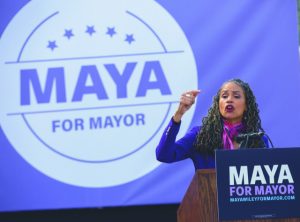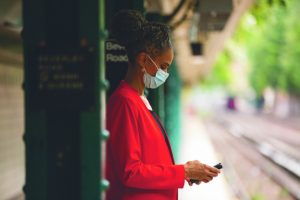
“We all see the world from the prism of our experience. The question is: How broad are our experiences? How deep are they?” Maya framed this fundamental question over the phone in the Fall of 2020, just weeks after announcing her groundbreaking – and unconventional – candidacy to be the next mayor of New York City.
Maya Wiley framed this fundamental question over the phone in the Fall of 2020, just weeks after announcing her groundbreaking — and unconventional — candidacy to be the next mayor of New York City. Wiley is a human rights activist and civil rights attorney with a decades-long record of leadership at the forefront of movements for social, economic, and racial justice. She is many other things, too. A black woman. A Brooklyn mom. A child of political icons.
But what Maya Wiley is definitely NOT is a politician. Which is probably both her greatest asset and her greatest challenge in the mayoral contest.
Wiley was born in 1964 in Washington, D.C., to politically active parents who met in Syracuse. In many ways, her birth was a testament to the complexities of our nation, then as now. Wiley’s father, George, was a professor of organic chemistry who became a leading figure in the civil rights movement. He rose to national leadership in the Congress of Racial Equality and then founded the National Welfare Rights Organization. As a Black man organizing mostly women of color to agitate for dignity and justice in public assistance, he was an early pioneer of what we now call intersectionality — how gender and race and class compound and connect. Wiley’s mother, Wretha, was a white woman from a Texas town Maya describes as “all white and very racist when she was growing up” who understood the injustice of exclusion and myopia and left to blaze a different path. I should clarify here that Maya Wiley is my friend from years of movement work together, and I met her mom several times before her passing. I can’t help but think that Maya’s candidacy to be the first Black woman mayor of the City of New York represents their daughter but also their hopes for our nation — that we could be the kind of place, the kind of people, who would choose their daughter to lead.
Because who Maya Wiley is is central to understanding what kind of mayor she would be. After graduating from Columbia Law School and then clerking in Philadelphia, Wiley moved to Brooklyn in 1991 where she’s lived ever since. She held positions at the NAACP Legal Defense and Education Fund and the ACLU, in addition to being a Senior Advisor on Race and Poverty at the Open Society Foundations, advancing human rights and justice around the globe. But perhaps the defining role in Wiley’s career was the one she created for herself when in 2002 she founded the Center for Social Inclusion, one of the nation’s first action-oriented think tanks focused on dismantling structural racism and inequity. With a tiny bit of seed money and, initially, running the organization without paying herself a salary, Wiley created applied research projects led in partnership with communities of color to develop and document transformative policy solutions in housing, food systems, technology access, and more. Yes, Wiley was also a prominent legal analyst for MSNBC and NBC until recently, a Senior Vice President and professor at The New School. Wiley may not be a conventional candidate but she is keenly aware of how city government works, how to manage within it, and what needs fixing to make us fairer and more just. She obviously has the chops to do the job. She served as the first Black woman to be Counsel to a New York City Mayor, serving early in Bill de Blasio’s administration. And after leaving in 2016, Chaired the NYC Civilian Complaint Review Board, sending the case of the officer who killed Eric Garner, former Officer Daniel Panteleo, to the NYPD to get him off the force.

But the formative part of Wiley’s career was spent not just talking about bold solutions to our biggest problems — but actually developing them. When most politicians were still struggling to use words like “intersectional” in a sentence, Wiley was working with grassroots communities and leading innovators to actually put intersectionality into practice — and policy.
And that deep track record from her past shows up in her campaigning today. “I am running because this city can and must do more than recover from Covid,” she told me over the phone when we spoke. “It must reimagine itself as a place where we can all live with dignity. That means a place where we develop without displacement. That means a place where we put the public back in public safety. That means a place where the government is a partner and not a pariah. That means a place where communities of concern get the investments they need in order to become whole.”
All of which Wiley insists is possible if we stop making bad choices forcing unnecessary trade-offs between helping affluent New Yorkers and Wall Street versus everyone else. “We can be a city that holds onto what we all love about New York,” Wiley says. “We love the fact that New York City is one of the most diverse cities in the world. That brings so much culture and innovation and makes us a place everyone wants to be. We have to hold onto that. But we can’t do that unless we reimagine the city as something that can include everyone.” In other words, Wiley argues, we don’t have to choose between fairness for all versus opportunity for some. There’s another way, where we “come together and have a real, honest conversation about what will make us stronger, what will make us more fair and more just… and bring this city back even stronger.” Wiley points to examples where we can make the city government more principled and more efficient and effective, invest in innovative affordable housing strategies and infrastructure investments that benefit us all.
But can we really do both? Yes, insists Wiley with her characteristic mix of gumption and faith. “That’s why we need a non-traditional leader. Because we always could do both. We just haven’t had that option.”
Women of color in particular, Wiley explains, have never had the luxury of just “sticking with the status quo or reacting to it. We’ve always had to create.” She makes the case for why we need more diverse and inclusive leadership not just based on principle but practice — the real, concrete difference that leaders with broader perspectives bring to the table.
“I don’t embody every other,” Wiley explains, “but there’s a recognition when you are forced by society, the way we’ve structured society, to have to see many different experiences. Not everybody is forced to do that, but if you are black and female and have been fortunate enough to see what it’s like to be in a segregated, overcrowded, underfunded public school and to see what it’s like in a private school with small classrooms… to have the privilege of living in a black neighborhood where folks could barely get by and living uptown where people are living in mini-mansions… you have a sense of what other experiences are like.” Which, to Wiley, is the point. We have constructed a society in which some of us, especially those of us often represented in positions of leadership, are distinctly less likely and even insulated from the experiences of others in our society. Electing Black women leaders isn’t just important because it makes our government look more like the people it represents but because diverse leaders can actually understand the lives and needs of all our communities. When we talk about leadership and say “experience matters,” we also have to broaden our understanding of experience. Actually having lived the plights of ordinary New Yorkers should be a political prerequisite for any leader professing solutions for those plights.
Which also may be the doorway to a different type of leadership altogether. Wiley isn’t just positing herself as some sort of singularly unique and therefore singularly able savior, in the vein of ego-centric messiah-like political figures before her. She wants to bring her intersectional experiences and ideas into governing but she doesn’t want to stop there; she also wants to reimagine governing to be inherently more inclusive, participatory, and transparent. To this end, as part of her campaign, Wiley is organizing “People’s Assemblies” that bring wide ranges of New Yorkers together to discuss their priorities and needs and challenges and concerns — ”no matter which candidate they support,” Wiley notes — and come up with shared solutions. “So we’re not just telling folks, ‘Here’s what we’ll do for you.’ We’re starting a democratic practice of coming together and having these conversations.”
In the first of these People’s Assemblies on the subject of gun violence, participants ranged from an Afro-Latina woman who grew up in public housing and a white man who was a former cop. The conversation — just the fact of them coming together and talking, and the shared struggles and solutions they and others were able to connect over — was, as Wiley describes it, “fantastic.” Several more People’s Assemblies will be organized by the campaign in the coming weeks and months.
“We’re not just asking for votes, we’re asking for community, we’re asking for folks to be in conversation,” Wiley adds. In this sense, Maya Wiley isn’t just a transformational candidate, she’s also running a transformational campaign.

Which in so many ways makes sense given Wiley’s community organizing roots. In 2014, as Wiley was preparing to work in the de Blasio Administration — where she would ultimately experience how the transformative potential of city government could be wasted under an ineffective, visionless mayor — Wiley spoke to then Politico-reporter Maggie Haberman about the move. “You could have gone and made a million dollars,” Haberman noted, asking why Wiley wanted to work in city government instead.
In response, Wiley shared a memory from her father. “[A] friend of his once asked him, when do you stop, George And his answer was, ‘When no one else is hungry. And his friend said, Well, that’s never going to be the case. And he said, Well then you never stop.’”
Let’s hope Maya Wiley never stops fighting to bring her transformative experiences and ideas — and the experiences and ideas of all New Yorkers — to the fore. If that fight ultimately takes her to City Hall, we’ll be a better city and a better community because of it.
